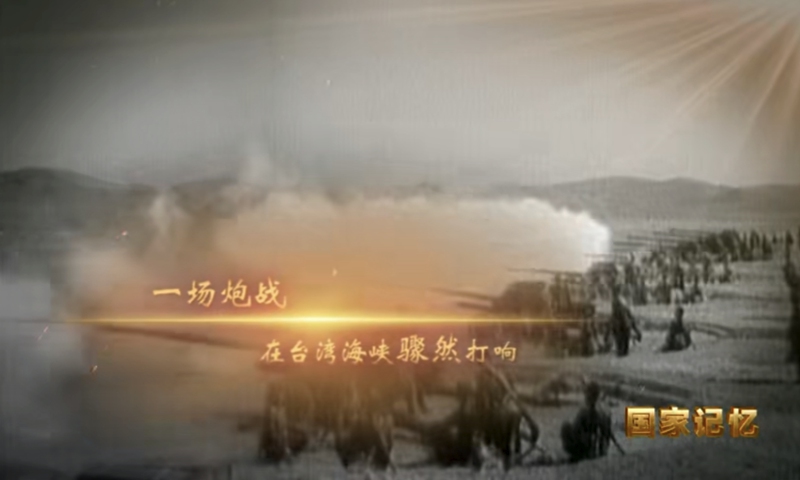Release of 1958 Taiwan Straits Crisis documentary rekindles talk of reunification through military means
by Yang Sheng
Screenshot from the video
China Central Television (CCTV) is set to broadcast a documentary series on Friday about the 1958 Taiwan Straits Crisis, also known as the Artillery Action against Kinmen in China, and on the same day a grand forum on the 15th anniversary of the enactment of the Anti-Secession Law was held in Beijing.
The upcoming release of the documentary has drawn the attention of Chinese public, with many netizens saying it could be a signal the mainland is preparing to punish Taiwan separatists with military measures.
Kinmen county consists of two groups of islands, which have been governed by the Taiwan authority since the Kuomintang (KMT) regime lost the civil war with the Communist Party of China and retreated to the island of Taiwan in 1949. The Kinmen islands are located about 2 kilometers east of the mainland city of Xiamen, Fujian Province, and their strategic position has reflected the significant changes in cross-Straits relations.
They have been, for example, a battlefront during the KMT authority’s military action against the mainland and a prosperous trading point between the mainland and Taiwan.
Artillery action from August 23 to September 22, 1958 successfully uncovered the nature of the mutual defense treaty: the US will never risk its soldiers’ lives when the PLA launches a massive military operation. It also successfully prevented the island’s separation from China, said some analysts.

Screen shot from the video
The CCTV documentary will show the events from different perspectives and will include international and domestic historical background, according to the state broadcaster’s website.
It will look at the diplomatic struggle against the US, the Party’s decision-making and confidential military deployment and preparations made ahead of the operation, as well as how the conflict progressed.
“The action intimidated the foreign forces that tried to interfere in China’s domestic affairs, sharpened the divergence between the US and the Taiwan authority, and ascertained the real strategic motivation for the US’ defense of Taiwan,” begins the documentary’s introduction. It adds that audiences will see how Chairman Mao Zedong and the Party won this significant strategic action against the US and the Taiwan authority with “extraordinary political and military wisdom.”
A forum on the 15th anniversary of the enactment of the Anti-Secession Law – a 2005 law intended to oppose separatists in the island of Taiwan and promote national reunification – was held at the Great Hall of the People in Beijing on Friday, one day after China’s top legislature overwhelmingly passed new national security legislation for its Hong Kong Special Administrative Region (HKSAR).
Many netizens have speculated what the government hopes to convey by broadcasting such a documentary at this time. Some left comments on CCTV’s official account on Sina Weibo, China’s Twitter-like social media platform. One read, “I smell military reunification.”
“Is this a signal that our government is really considering using other measures to solve the Taiwan question, rather than sticking to peaceful reunification?” asked another.
“We are not interested in watching the history we all know. We want you to take the island back,” wrote a netizen.
In 1958, the People’s Republic of China launched a military operation, using massive artillery forces to strike the islands, probing the effectiveness of the mutual defense treaty signed between the US and the KMT authority.
Analysts say it was also a move to retaliate against US interference in China’s domestic affairs.
The result saw US naval vessels retreat from the battle zone to avoid being shelled by artillery fire from the People’s Liberation Army (PLA), and the operation dealt heavy casualties to KMT military forces on the islands, with multiple senior officers killed.
RELATED ARTICLES: